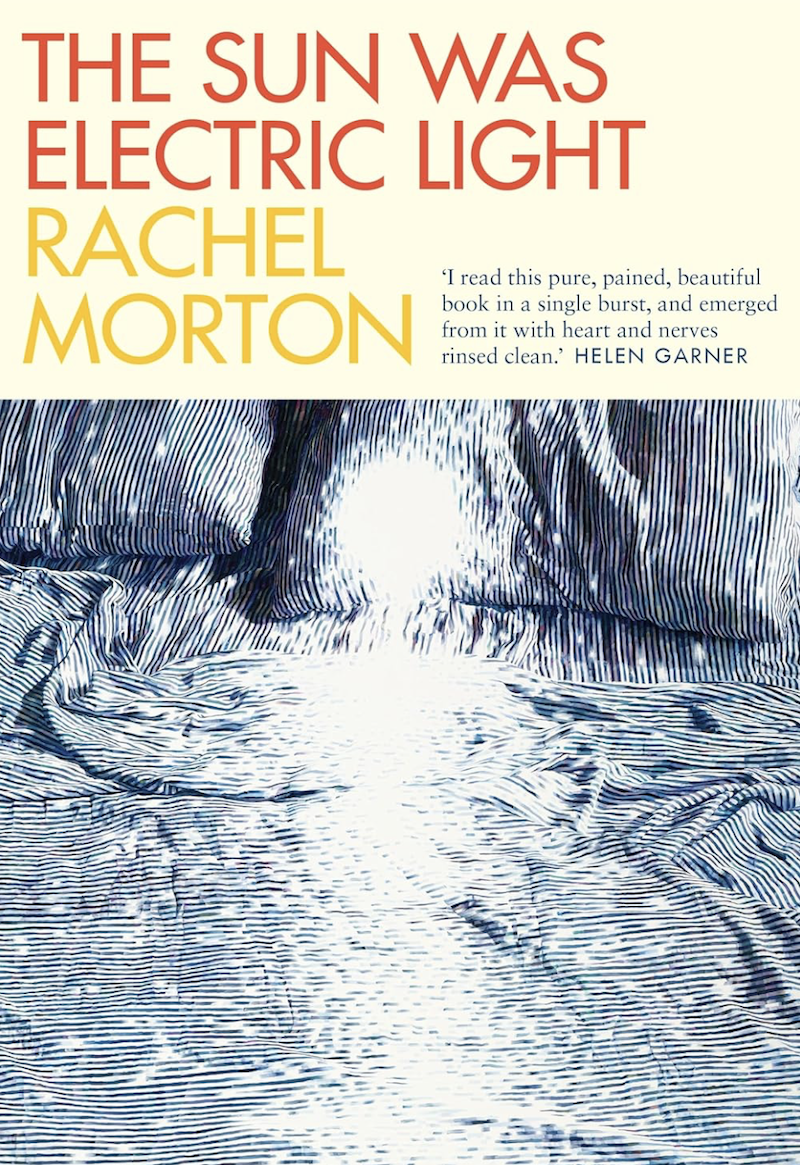The Sun Was Electric Light by Rachel Morton
“I kept walking and I saw the lake, just the very top of it; it sparkled like jewellery in the afternoon heat. I reached the shore and took off my shoes and sat down. The sand was gritty, half sand and half dirt, laced with twigs and rocks and leaves. I rubbed my toes in it. Rubbish floated in the water near my feet, old rubbish, cloudy and pale with time.”
Winner of the 2024 Victorian Premier's Literary Award for an Unpublished Manuscript, Rachel Morton’s The Sun Was Electric Light (2025) is an introspective journey through displacement, longing and the elusive promise of belonging. Disillusioned by her life in New York, Ruth slips away to Panajachel – a lakeside town in Guatemala, where she last remembers feeling happiness a decade earlier. There, she connects with two women whose friendships will test her understanding of stability and the fine line between being a visitor and a local: Emilie, calm and pragmatic, and Carmen, wild and chaotic.
The early chapters hover over Ruth’s arrival: scenes of fellow travellers, first impressions of the lake and the surrounding town, the heat and the Guatemalan highlands. Morton’s novel unfolds at an unhurried pace, reflecting Ruth’s own emotional inertia.
“The days became a singular thing. I let myself sleep in. I walked to a stall in the street and bought tortillas and refried beans. I bought coffee too; it was weak and warm and it tasted of earth. Mornings at the lake sparkled with light; the sun warmed the jetty and the sand.”
This measured tempo invites readers to settle into Ruth’s perspective, but it can sometimes verge on ‘telling’ rather than ‘showing’, as Morton summarises Ruth’s experiences. I often felt held at arm's length by Ruth, as she moves from one activity to the next, observing and telling us what she’s doing. In a novel tackling themes of mental health and instability, it felt hard to know if this was completely intentional or not.
The narrative comes most alive in the exploration of Ruth’s relationships. With her grounded kindness and steady routines, Emilie represents a safe harbour that slowly builds into something more: shared breakfasts, long phone calls, Ruth experiences the generosity of a woman who knows what she’s doing with her life. Running out of money, Ruth takes a job and her work as a nanny and then an English teacher in a small local school deepen her ties to the community. But again, these often felt held at arms' length; the locals are there but not there, and we’re told how Ruth interacts with them without much feeling from Ruth.
Ruth spends most of her time with Dwain and Carmen, two individuals who grew up in Guatemala but whose parents were both Americans. Their experiences of being ‘from here’ but not, pull the theme of belonging into closer inspection:
“‘Ruth, you don’t get it. Carmen is right. You’re not from here.’ He waited, as though wondering if he should speak. ‘Don’t you get it by now? There’s no future here. Carmen’s right about this place. It sucks you in and if you stay, it drives you crazy. It won’t let you leave. It always wins.’”
Carmen, a woman whose magnetic restlessness draws Ruth immediately to her, provides Ruth with a misplaced sense of escapism. Morton captures Carmen’s volatility with empathy, sketching a character both intoxicating and troublesome. Her fragile hold on the world looms larger the more Ruth gets to know her, but Ruth’s own struggles seem to prevent her from being any more than an observer of Carmen’s unravelling. As Carmen edges toward breakdown, Ruth’s own loyalties fracture:
“But I had a feeling that wouldn’t go away. It was to do with Carmen and the lake. Since my life had gotten better here, I had not been thinking about her, or it. I had separated what had happened over there into a different container in my life. I didn’t want to say goodbye to Carmen. I had been putting it off.”
Morton questions the price of rootedness and the perils of romanticising escape. Ruth’s decision to stay at the lake is not a homecoming, nor does it offer any sense of safety. Instead, it becomes a test of her capacity to commit, even as her past lingers and Emilie tries to pull her forward.
This is a powerful debut that many will find filled with richness. Readers who enjoy subtle character studies will appreciate the reflective tone. However, there may be others (like myself) who might want more from such a unique and diverse setting. Although Ruth is drawn to Panajachel for the lake and ‘once being happy there’, we never really learn what that happiness was, nor the catalyst that prompts her to uproot her life. The lake fades quickly into the backdrop of her other immediate experiences with Carmen, Emilie and Dwain, and I never felt it fully come to life in the ways I hoped.
The Sun Was Electric Light demands patience, providing a compelling meditation on what it means to belong and if it's ever something we can choose for ourselves, whether physically, emotionally or spiritually. Ruth’s journey reminds us that home is less a place than a set of commitments we must make and keep making. This is a book that will leave you with a lot of good food for thought.
Read our Emerging Writers interview with Rachel Morton here.
Elaine Chennatt is a writer, educator and psychology student currently residing in nipaluna. She has a special interest in bibliotherapy (how we use literature to make sense of our lives) and is endlessly curious about the creative philosophies of others. She lives with her husband and two bossy dachshunds on the not-so-sunny side of the river (IYKYK). Find her online at wordswithelaine.com.
